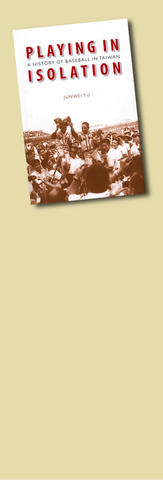A detailed history of Taiwanese baseball may sound like a dry topic to readers uninterested in the sport. But in many ways, baseball is only one aspect of Junwei Yu's (盂峻瑋) book Playing in Isolation: A History of Baseball in Taiwan. While the book is certainly aimed at baseball fans, it is also a good read for anyone wanting a unique look at 20th century Taiwanese history from an angle not usually covered in textbooks.
Yu does an admirable job of looking at Taiwanese baseball from a neutral, academic perspective. In fact, the book is an adaptation of his PhD dissertation. It is not just a catalogue of baseball's growth, but an in-depth analysis complete with references, citations and theses.
In his effort to make the work academically viable, Yu has had to step outside the narrow scope of baseball and explore its historical and political context. This close connection between baseball history and Taiwanese history is what makes it such an interesting read. Yu begins with the sport's introduction during Japanese colonial rule, traces its development through the Chinese Nationalist Party (KMT) era and finishes with the issues facing Taiwan's professional and amateur players today.

These eras have been well studied. But by analyzing their impact on baseball, Yu adds new twists to the common analyses. For example, he describes how grassroots baseball flourished under the Japanese because they encouraged athletics to maintain a physically fit population of potential soldiers for their war effort. Meanwhile the traditional Chinese Confucian thinking that was popularized under the KMT emphasized academics, and looked on physical exercise with distain. Yu also credits baseball for helping to integrate Taiwan's various ethnic groups and pull the country together. When Taiwan started achieving international success in Little League Baseball (LLB), the Mainlander population, which preferred basketball, put more effort into developing baseball, which had previously been the domain of Aboriginals and Hoklos. In fact, Yu says that Taiwanese historians credit youth baseball for introducing Taiwanese to mainland food.
Yet despite the contributions that baseball made, Yu's version of its growth in Taiwan is anything but rosy. He even includes a three-page appendix of the players and punishments dealt out in the various gambling and cheating scandals. Rather than romanticizing its history, Yu enthusiastically seeks to debunk several of Taiwanese people's most cherished "myths" surrounding their country's greatest baseball achievements. His first target is the Hongye elementary school team in Taitung County, which sparked Taiwan's obsession with LLB when they defeated a visiting Japanese team in 1968. Yu points out that the Japanese squad was not a world champion team, as many Taiwanese still believe today. He also examines how many of the players on the Taiwanese team played under assumed names, as many of them were above the age of little league regulations.
While the team's victory was, and remains for many, a source of immense pride, Yu works to expose the ugly consequences. He credits Hongye's victory as the beginning of a winning-is-everything mentality that destroyed the spirit of fun and hastened the decline of Taiwanese grass-roots baseball. Moreover, he says that the KMT government "hijacked baseball, transforming it into a nation-building tool to offset [its] debacles on the political and diplomatic fronts" and that "the Hongye boys became surrogate warriors for a country that could not succeed on political and diplomatic fronts."
Yet underlying all of Yu's frank criticism and scandal exposure is an intense love of the game. He freely describes how the Taiwanese little league teams that dominated the LLB championship competition in the 1970s were actually national all-star teams - in violation of LLB rules - and how Taiwanese authorities deliberately deceived LLB officials sent to investigate. But Yu seems uninterested in Taiwan's international baseball prestige. Rather, the real lamentable consequence for him is the impact of the LLB championships on grass-roots baseball, and the change in attitude that the titles encouraged. He says that the success of these teams "brought distortion and ugliness to schools that focused solely on turning out championship players and teams" and that "Taiwan paid a large price for its LLB membership in terms of attitude toward, values of, and development of the island's baseball."
The book is certainly most suited to baseball fans. Yu at times provides more information than casual English readers care to know, and readers without some background will find names of players going by in a blur. However, for anyone interested in Taiwanese politics, Yu has interesting perspectives on how the government used LLB as a tool in its "second-track diplomacy" against international isolation. Or, readers might be interested to learn how grassroots baseball played an important role in preserving Holko language when the KMT instituted its Mandarin-only policy.
As Yu is quick to point out, baseball's history in Taiwan has been blemished with scandal at all levels of the game. Yet for Yu, the scandals and cheating incidents are not an inherent flaw in Taiwan's version of the sport. Rather, they all have their origins in factors that can be traced and identified. Much of the problem, in Yu's view, is that since Taiwan first achieved international success with the LLB, Taiwanese have viewed baseball as a means to an end: championships and international recognition. He believes that if people played the game for fun as it is intended, many of those problems would go away.
With Taiwan's baseball community today still more focused on international superstars than home-grown leagues, Yu's version of baseball's development seems all the more relevant.

Many people noticed the flood of pro-China propaganda across a number of venues in recent weeks that looks like a coordinated assault on US Taiwan policy. It does look like an effort intended to influence the US before the meeting between US President Donald Trump and Chinese dictator Xi Jinping (習近平) over the weekend. Jennifer Kavanagh’s piece in the New York Times in September appears to be the opening strike of the current campaign. She followed up last week in the Lowy Interpreter, blaming the US for causing the PRC to escalate in the Philippines and Taiwan, saying that as

This year’s Miss Universe in Thailand has been marred by ugly drama, with allegations of an insult to a beauty queen’s intellect, a walkout by pageant contestants and a tearful tantrum by the host. More than 120 women from across the world have gathered in Thailand, vying to be crowned Miss Universe in a contest considered one of the “big four” of global beauty pageants. But the runup has been dominated by the off-stage antics of the coiffed contestants and their Thai hosts, escalating into a feminist firestorm drawing the attention of Mexico’s president. On Tuesday, Mexican delegate Fatima Bosch staged a

Taiwan can often feel woefully behind on global trends, from fashion to food, and influences can sometimes feel like the last on the metaphorical bandwagon. In the West, suddenly every burger is being smashed and honey has become “hot” and we’re all drinking orange wine. But it took a good while for a smash burger in Taipei to come across my radar. For the uninitiated, a smash burger is, well, a normal burger patty but smashed flat. Originally, I didn’t understand. Surely the best part of a burger is the thick patty with all the juiciness of the beef, the

Would you eat lab-grown chocolate? I requested a sample from California Cultured, a Sacramento-based company. Its chocolate, not yet commercially available, is made with techniques that have previously been used to synthesize other bioactive products like certain plant-derived pharmaceuticals for commercial sale. A few days later, it arrives. The morsel, barely bigger than a coffee bean, is supposed to be the flavor equivalent of a 70 percent to 80 percent dark chocolate. I tear open its sealed packet and a chocolatey aroma escapes — so far, so good. I pop it in my mouth. Slightly waxy and distinctly bitter, it boasts those bright,